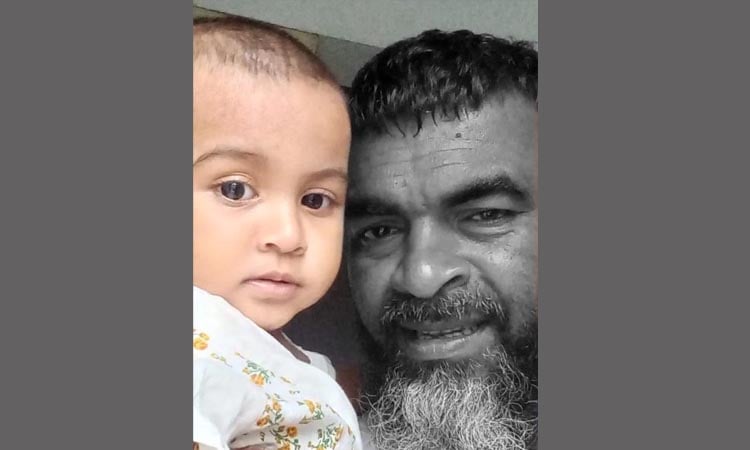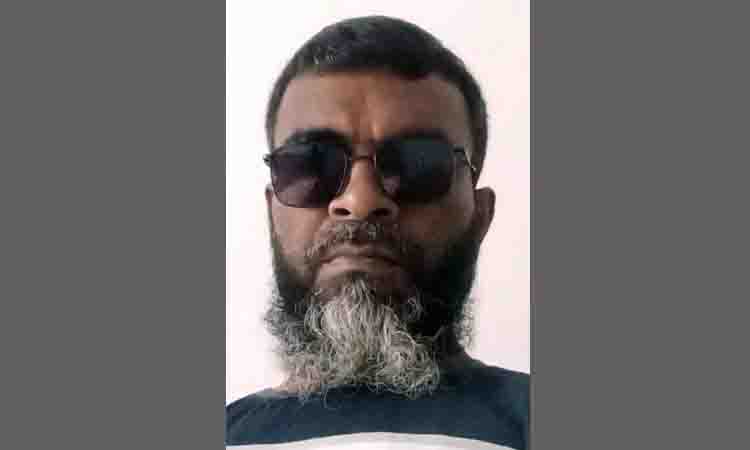
by Syed Altefat Hossain
DHAKA, Dec 11, 2024 (BSS) - "My father felt a fatherly affection for the agitating students on the streets. Thus, he decided to go out and feed them, ignoring life risk," Habib's elder daughter Fatema Akter (20) shared her father's courageous role in the movement that finally toppled autocratic ruler Sheikh Hasina.
Md Habib (45) sacrificed his life during the Anti-Discrimination Student Movement when people of all strata started opposing ruthless crackdown on peaceful protests.
But extreme reality is that martyrdom of Habib has left his family plunge into dire financial hardship as he was the only breadwinner of his six-member family.
Habib, a private car driver by profession, was "shot dead by police" in the Shanir Akhra area on July 20 while he was preparing hotchpotch for demonstrators as he couldn't ignore the plight of the protesting students on the streets under the banner of anti-discrimination student movement.
"My father felt a fatherly affection for the agitating students on the streets. Thus, he decided to go out and feed them, despite our warnings to stay back home," Habib's elder daughter Fatema Akter (20) shared her father's generosity.
"Please, Baba (dad), don't go outside. There is huge trouble on roads. We have no one but you. If something happens to you, how will we survive?" Fatema begged her father that morning, hugging him tightly. "I don't know why I was feeling extra compassion and affection for my father on that morning," she said.

"Your father doesn't fear anyone. If something happens to me, it will be for the country. The oppression of the students cannot be tolerated anymore," she recounted her father's reply to her and said, "Little did I know that those would be the last words I would ever hear from him."
Fatema recalled her last moment memories with her father at an interview with BSS recently at their rented house in the Paterbag area of Dania in Jatrabari area of the capital. She said her father used to go to the movement as he had no work due to deadlock situation triggered by the student-led mass uprising that successfully ousted autocratic ruler Sheikh Hasina on August 5, ending her about 16-year fascist regime.
Md Nuruddin (35), Habib's younger brother who is now living with the bereaved family since Habib's death, recalled the harrowing events leading up to his brother's death.
On that fateful day, he said, Habib was preparing hotchpotch after gathering money from others to feed the demonstrators. He even collected firewood himself to cook three large pots of hotchpotch. Despite the chaos surrounding him, he remained focused on helping the agitators.
Nuruddin, however, recounted how the police, in a display of hostility, kicked over two pots of hotchpotch, spilling them onto the ground. As Habib rushed to save the third pot, eyewitnesses reported that he was "shot by the police" on the right side of his stomach around 2.30pm while holding the pot.
According to Habib's family members, those who witnessed the incident remained unknown, but their accounts paint a tragic picture of Habib's final moments.
After being shot, Habib lay abandoned on the road as the police continued indiscriminate firing leaving bystanders too afraid to rescue any injured person.
Eventually, two pedestrians gathered the courage to rescue him and took him to a private hospital nearby Shanir Akhra. However, the hospital authority refused to give him treatment, citing they were ordered by higher authorities from the then government not to provide treatment to gunshot victims.
"Around 2.45pm one of the pedestrians called me and told me that my brother was taken to Dhaka Medical College Hospital (DMCH)," Nuruddin recalled the memory of getting the heart-breaking news.
Habib's daughter said, "Witnesses later told us that my father, even in his final moments, thought about us".
"Brother, please save me. I have three daughters and one son. What will happen to my family if I die?" Habib had pleaded with the pedestrian, according to Fatema.
"My father's love for us was boundless. He wanted to live, not for himself, but for us. He was a courageous man who despite his critical injury tried to call us from his own mobile phone," she said.
But Habib couldn't reach his family members as the mobile network system was not working properly at that moment while internet service was suspended. Fatema slapped the then ICT state minister Zunaid Ahmed Palak for making communication systems disabled that left them in the dark about her father's condition.
"We only learned about my father's injury when my uncle (Habib) informed us. He told us that my father had been rushed to the DMCH. Immediately, my brother and I rushed to the hospital and found my father in Room No. 3," she said with a heavy heart.
"As I thought my father was just asleep, I was screaming, saying why my father was not being given proper treatment. At that time a doctor scolded me, and another signaled silently that my father has passed away. My world fell apart at that moment," Fatema burst into tears while recalling the fatal incident.
Coming down heavily on the DMCH authorities, she said when the rescuers took Habib to the leading public health facility failing to get treatment at the local hospital, he was denied adequate treatment even there.
The hospital staff injected only two injections in his neck before pronouncing him dead within 20 minutes, she said referring to one of the rescuers who took her father to the DMCH.
Describing the injustice they faced even after Habib's demise, his daughter said their anguish did not end with Habib's death as his body was left on the floor of the DMCH morgue for two days, swelling and decomposing in the heat.
When the family tried to get the body, they were met with more obstacles as hospital authorities and police didn't cooperate with them.
"The journey to retrieve my father's body was filled with humiliation and fear. When my mother, brother, and a relative went to Jatrabari Police Station to lodge a General Diary (GD) to get the body from the hospital, the police refused to help," Fatema said.
"Instead, they pushed my family members out of the station and even searched my relative with a gun pointed on his chest," Fatema's eyes were filled with grievance while recalling the inhumane gesture of law enforcement agency members.
Nuruddin said later with the help of the Officer-in-Charge (OC) at Shahbag Police Station they lodged a GD with the station and received the body around 11.30pm on July 22 in exchange for Taka 15,000 to 20,000. However, they were warned by the hospital authority that any resistance would result in further delays or make the body disappear.
Later, they laid Habib to his eternal rest at the Jurain graveyard in the city as they were unable to take his body to their ancestral home in Lalmohan Upazila in Bhola district as the body got swollen.
Habib's daughter, however, said they could not reveal the real cause of his father's martyrdom fearing oppression of the then ruling party supporters. "After, my father's death, we couldn't say that my father was killed while preparing food for the protesters as at that time supporters of Sheikh Hasina were harassing the families of the people killed or injured in the movement," Fatema said.
Habib's death, however, left his family, including wife Ayesha Khatun (35), three daughters- Fatema, who passed HSC exam this year, Habiba Islam Kulsum (6), studying in playgroup, and Humayra Islam Ayat (1.5) - and son Md Riad (17), Hafiz-e-Quran, in distraught and adrift.
"My father was our sole breadwinner, supporting our six-member family with his hard-earned income. Unfortunately, our family became five following the demise of my father in the uprising. Now, we're left grappling with an uncertain future," said Fatema with a heavy voice.
Habib's teenage son was forced to take up a factory job for a meager wage, but the income barely covers the house rent, leaving little for food, education and other necessities.
"My son is very young, and my two daughters are still studying. We don't have the means to support ourselves or secure a decent future for my children," Ayesha, Habib's wife, said with a heart weighed down by grief and uncertainty.
Noting that Habib worked tirelessly to ensure that his family never endures hardship, she said he even guided his son to become a Hafiz-e-Quran and dreamt of seeing him become a Maulana.
But that dream was cut short following Habib's supreme sacrifice for the country, Ayesha added.
"My daughter is contributing to the family by freelancing and doing tuition. But when she gets married, she won't be able to help anymore. If the government can give my son and daughter suitable jobs, it would help us survive," an uncertainty was manifested on the face of Ayesha while sharing her agony.
Habib's wife dreamed of securing her daughter's future through a good marriage and providing her son with an opportunity to build a meaningful life. But without support, those dreams seem distant.
"How can I endure the pain of losing my husband? I don't know how long I will survive, but I am worried about my children's future," wailing Ayesha said.
The widow is now left with nothing but her children and her faith in Allah. "Please, look after my children. Help me foster them. We have no one except Allah and you," she said referring to the current government.
Standing in the ruin, Habib's daughter, however, is seeing a hope to turn around "if she gets help from the government".
Mentioning that no one from the government has inquired about them or offered any assistance, she said, "My father gave his life in a moment of courage and selflessness, yet his sacrifice seems to have gone unnoticed".
"I am determined to continue my study. As I passed the HSC exam this year, I am dreaming of getting admission into a university and building a better life for my family. With my computer skills, I could work, but finding a job is difficult. If the government could provide me with suitable employment, it would help me continue my study and support my family," Fatema was observed to be very optimistic while sharing her determination.
Being a landless and homeless family, Fatema said her father had a small piece of arable land in their village, but it has been grabbed by others.
"If we could recover that land, it would give us some stability. We desperately need the government's support to reclaim it and help us survive," she said.
Demanding justice for killing Habib, his wife said with her voice cracking, "My husband committed no crime. He dedicated his life for the country. He saw the students protesting on the streets without food and said, 'If required, I will dedicate my life for the students."
On July 20, she said, Habib acted on those words. "He collected firewood and cooked food for the protesting students, putting their needs above his own safety".
Weeping Ayesha firmly said "Sheikh Hasina killed my husband. I want the trial of Sheikh Hasina".